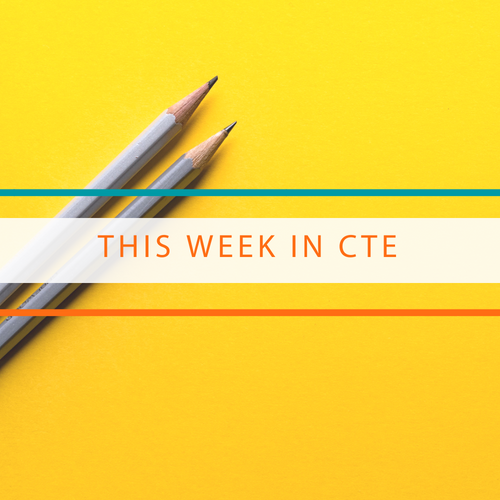Earlier this month Americans across the country went to the polls to decide the balance of power for the upcoming 118th Congress. Elsewhere Career Technical Education (CTE) champions highlighted the importance of career development while the U.S. Department of Education (ED) released new guidance intended to support career connected learning.
 Midterm Election Results Become Clearer
Midterm Election Results Become Clearer
Earlier this month, the long-awaited midterm elections took place across the country. At the time of our last update, the results from these electoral contests were still coming in with control of both the House and the Senate unclear. Since that time, additional outcomes from these elections have been announced making clear that the Republican Party will take control of the House in the coming 118th Congress. Democrats will retain control of the Senate, although the size of their majority will be determined by a runoff election in Georgia set to take place on December 6.
As these results continued to trickle in, federal lawmakers returned to Capitol Hill just before Thanksgiving for a short session to begin the process of determining party leadership for both chambers moving forward. In the House, longtime Speaker Nancy Pelosi (D-CA) and her core leadership team announced that they were stepping down. This will pave the way for a new Democratic leadership team, likely to be led by Rep. Hakeem Jeffries (D-NY). For House Republicans, longtime Minority Leader Kevin McCarthy is currently working to garner the necessary support to be the next Speaker of the House. The final composition for both party’s leadership teams remains fluid. However, in the Senate, Democrats and Republicans will likely continue to be led by current Majority Leader Chuck Schumer (D-NY) and Minority Leader Mitch McConnell (R-KY) pending final approval from their caucuses.
In addition to these recent developments, it is also being widely reported that Senators Bernie Sanders (I-VT) and Bill Cassidy (R-LA) are likely to lead the Senate’s Health, Education, Labor, and Pensions (HELP) Committee in the next Congress. Leadership announcements for the House Education and Labor Committee are still forthcoming and hinge on the ability of current Ranking Member Virginia Foxx (R-NC) to secure a waiver from Republican leadership to serve as chair of the committee in the next Congress. Sens. Patty Murray (D-WA) and Susan Collins (R-ME) are widely expected to lead the Senate Appropriations committee which helps to determine funding for programs like Perkins V.
As additional leadership roles and responsibilities become clearer in the coming weeks, Advance CTE will continue to update the CTE community and provide insights on implications for federal policymaking. Congress now reconvenes this week for a jam packed “lame duck” session of the current 117th Congress where they must attend to a number of important issues, including federal fiscal year 2023 (FY23) funding for programs like the Perkins Act’s basic state grant program. Be sure to check back here for more updates!
CTE Caucus Co-Chairs Introduce Career Development Resolution
Longtime House CTE Caucus co-chairs Reps. Thompson (R-PA) and Langevin (D-RI) introduced a resolution earlier this month designating November as National Career Development Month. When introduced, Advance CTE’s Executive Director, Kimberly Green said, “A hallmark of high-quality CTE is career development opportunities that equitably support learners as they explore and pursue their career passion. Advance CTE is proud to support this bipartisan resolution designating November as National Career Development Month from Representatives Thompson and Langevin, which recognizes the crucial role career development contributes to a skilled workforce and learner success in education, work, and in life.” Read more about the resolution here.
Department of Education Announces Initiative to “Unlock Career Success”
The U.S. Department of Education (ED) recently announced the launch of a new initiative called Raise the Bar: Unlocking Career Success. This is a new Administration initiative supported in conjunction with the U.S. Departments of Commerce and Labor aimed at increasing and expanding access to high-quality college and career pathways programs to help more young Americans pursue careers in in-demand fields, and prepare for careers of the future. The effort is intended to strengthen ties between K-12 education, postsecondary education, and workforce programs among other priorities. As part of this announcement, the Departments shared that they are also providing $5.6 million in competitive funding for a new grant initiative that aims to expand work-based learning opportunities for students. The department also plans to host regional summits with students, educators, employers and other stakeholders to learn about practices that have led to success and challenges that must be addressed.
Department of Education Publishes Guidance on ARP Funding Use for Career Pathways
The U.S. Department of Education released new guidance through a Dear Colleague letter on how unspent federal funds from the American Rescue Plan (ARP) and other pandemic aid packages can be used for career pathways. The guidance highlights how these resources can be leveraged around four main priority areas including, expanding access to dual enrollment opportunities, providing strong career and college advisement and navigation supports, expanding opportunities for high-quality work-based learning, and giving all students the option to earn industry-sought credentials. Be sure to check out Advance CTE’s resource– published last year– which also provided ideas and guidance to the CTE community regarding how these funds could be used in support of CTE.
Senate CTE Caucus Hosts Apprenticeship Briefing
Written by Jori Houck, Media Relations and Advocacy Associate, Association for Career and Technical Education (ACTE). Original post can be found here.
On November 15, the Senate CTE Caucus, alongside the Swiss and Austrian Embassies, held a Capitol Hill briefing on Women in Apprenticeship to highlight both National Apprenticeship Week and the Austrian and Swiss apprenticeship models. Welcoming remarks were made by Ambassador of Switzerland Jacques Pitteloud and the Austrian Chargé d’Affairs Günther Salzmann. Both expressed a desire to broaden the influence of the Swiss and Austrian apprenticeship models in the United States.
Sen. John Hickenlooper (D-CO) offered additional remarks, highlighting the connection between CTE and apprenticeships. He discussed how recent federal investments will ensure that CTE is at the forefront of preparing apprentices and all learners for good-paying, in-demand jobs. Sen. Hickenlooper also declared that he had officially joined the CTE Caucus!
A panel discussion followed and was moderated by Thomas Mayr of Austria’s Vocational Education and Training department. Apprentices and representatives from four Swiss and Austrian companies, Zurich Insurance of Illinois, Swiss Krono of South Carolina, Egger Wood Products of North Carolina and Engel Machinery of Pennsylvania, each spoke about the recruitment challenges, opportunities, supports needed and benefits of their apprenticeship programs. Each apprentice expressed that if given the chance to pursue an apprenticeship again, they would make the same decision.
Steve Voytek, Policy Advisor


 That leaves remaining challenges around data capacity. Even as youth apprenticeship programs increase their enrollment, the existing apprenticeship data infrastructure is insufficient to monitor and support these emerging programs. State and federally administered Registered Apprenticeship programs can submit data through the Registered Apprenticeship Partners Information Database System (RAPIDS), but this system cannot yet differentiate between traditional and youth apprenticeship programs.
That leaves remaining challenges around data capacity. Even as youth apprenticeship programs increase their enrollment, the existing apprenticeship data infrastructure is insufficient to monitor and support these emerging programs. State and federally administered Registered Apprenticeship programs can submit data through the Registered Apprenticeship Partners Information Database System (RAPIDS), but this system cannot yet differentiate between traditional and youth apprenticeship programs.  This is the third blog in a series published in partnership with New America through the
This is the third blog in a series published in partnership with New America through the  Democratic lawmakers in Congress have made progress on a domestic spending package aimed at investing in the nation’s human capital infrastructure, including Career Technical Education (CTE). Meanwhile, a House subcommittee recently examined how states and school districts are making use of education-related pandemic aid while the U.S. Department of Education (ED) issued new nonregulatory guidance, announced changes to civil rights data collections and more.
Democratic lawmakers in Congress have made progress on a domestic spending package aimed at investing in the nation’s human capital infrastructure, including Career Technical Education (CTE). Meanwhile, a House subcommittee recently examined how states and school districts are making use of education-related pandemic aid while the U.S. Department of Education (ED) issued new nonregulatory guidance, announced changes to civil rights data collections and more.  Our new career preparation ecosystem, designed under
Our new career preparation ecosystem, designed under  Developed with input from nearly 200 national, state and local education and workforce development leaders and supported by 40 national organizations,
Developed with input from nearly 200 national, state and local education and workforce development leaders and supported by 40 national organizations,